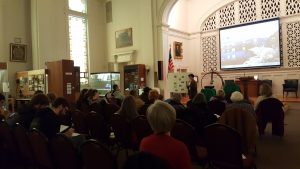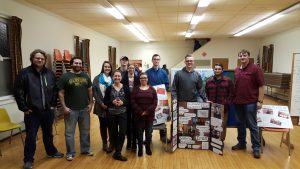Students talk Citizenship and Suffrage struggles
 A robust audience of roughly 30 people gathered at the Oneida County Historical Society December 2 to soak in the research of students from SUNY Poly’s History-Interdisciplinary Studies Gender Issues in World History class and ask questions about citizenship and suffrage struggles in New York and around the world.
A robust audience of roughly 30 people gathered at the Oneida County Historical Society December 2 to soak in the research of students from SUNY Poly’s History-Interdisciplinary Studies Gender Issues in World History class and ask questions about citizenship and suffrage struggles in New York and around the world.
A parallel event was held at the Midtown Utica Community Center (MUCC) just a few days later on December 2.
Free and open to the public, the family-friendly program included creative, interactive stories and activities about activists and their achievements for children in first grade and up. Among those in attendance were children under the age of 10 as well as several teenagers and adult community members.

“I was very proud of my students,” said Professor Kristina Boylan, who teaches Gender Issues in World History at SUNY Poly. “They spoke clearly, used a range of modalities to present, from informative Powerpoint presentations on Morocco, Madagascar, and Romania to poster boards on Iran, Japan to poems read with audience participation (also focused on Japan), to a projected-image storybook narrating the experiences of a young Afghan girl.”
Audience members asked questions of multiple students, with the Iran and Afghanistan presentations eliciting the most responses, particularly regarding the tensions between fundamentalists that Boylan notes are more well-known from media portrayals and existing traditions of struggles for rights and political participation for women.
“The students delivered strong performances on an unusual assignment, that of ‘translating’ their research on the history of rights struggles in different world regions and time periods for younger and non-academic audiences.,” Boylan explains. “They engaged members of our local community in discussions of global history and issues, showing the value of using critical approaches to society and technology that are part of their SUNY Poly courses like this one and programs of study. Also, the students demonstrated in their public presentations and their research/reflection papers that they themselves had engaged in sophisticated ways with a range of sources, methods of analysis, and choices made in project development. Future students take note – their hard work and successes motivate me, and, I hope, other instructors, to use service-based learning assignments with a public/broader audience element in other history classes!”
Recent Comments
Archives
- September 2018
- August 2018
- May 2018
- April 2018
- March 2018
- February 2018
- January 2018
- December 2017
- November 2017
- October 2017
- September 2017
- May 2017
- April 2017
- March 2017
- February 2017
- January 2017
- December 2016
- November 2016
- October 2016
- September 2016
- August 2016
- May 2016
- April 2016
- March 2016
- February 2016
- January 2016
- December 2015
- November 2015
- October 2015
- September 2015
- August 2015
- May 2015
- April 2015
- March 2015
- February 2015
- January 2015
- December 2014
- November 2014
- October 2014
- September 2014
- August 2014
- May 2014
- April 2014
- March 2014
- February 2014
- January 2014
- December 2013
- November 2013
- October 2013
- September 2013
- August 2013
- June 2013
- May 2013
- April 2013
- March 2013
- February 2013
- January 2013
- December 2012
- November 2012

